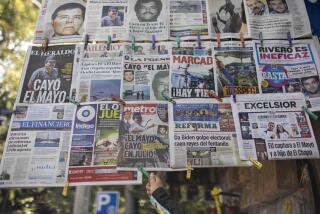Peru May Seek Death Penalty for Rebel Chief : Terrorism: Fujimori says arrest of Shining Path leader ‘cuts the brain out’ of fierce guerrilla army.
- Share via
LIMA, Peru — President Alberto Fujimori, saying that Sendero Luminoso chieftain Abimael Guzman should get the death penalty, declared Monday that the guerrilla leader’s capture “cuts the brain from the organization” that has ravaged Peru with 12 years of bloody terrorist warfare.
The maximum legal penalty in Peru is life in prison but Fujimori said he personally would favor the death penalty for Guzman, 57. He said that the Maoist terrorist will be tried by a military court on charges of treason and that a verdict should come before the end of October.
Anti-terrorist police, known by the acronym DINCOTE, captured Guzman and seven of his aides late Saturday in a suburban home used by Sendero Luminoso, or Shining Path, as a safehouse. Fujimori visited DINCOTE headquarters Monday afternoon to congratulate the police for what analysts agree is a stunning and possibly devastating blow to Latin America’s fiercest guerrilla army.
“This capture signifies the de-articulation of Sendero Luminoso on a national level,” said Fujimori. “It cuts the brain from the organization. This beheading, this loss of leadership, is why this is a transcendental event.”
Fujimori, clad in a gray-striped poncho, spoke through a bullhorn to hundreds of reporters who jammed a sixth-floor auditorium in the same 15-floor building where Guzman is being held.
He said that DINCOTE may legally hold Guzman for 15 days for “investigation” before turning him over to a military tribunal for a trial that can last no more than 30 days. Thus, within 45 days of his arrest, Guzman “should be convicted,” Fujimori said.
Fujimori, elected in 1990, closed down Congress and assumed authoritarian powers April 5, arguing that politics and corruption were blocking his efforts to revive Peru’s impoverished economy and fight terrorism. After the coup, he issued a decree that defines responsibility for terrorist actions as treason against the nation, subject to military justice.
“The maximum penalty contemplated at this time is life in prison, but obviously one should listen to what public opinion is clamoring for,” the president said. “Justice must be just, and be practical, in keeping with the magnitude of the damage.”
Since Guzman launched his war in 1980 to establish a peasant-worker state, more than 26,000 Peruvians have died in political violence.
Pressed to elaborate, Fujimori said: “Personally, aside from my office, I would be totally in agreement with the death penalty.”
He said Guzman will be put in a high-security prison.
“He will be able to receive one visit a month by a maximum of two relatives--total isolation,” he said.
Late Sunday night, Fujimori spoke on national television, calling Guzman a “monster.” Video clips of Guzman, introduced by the president on television, revealed a pudgy, bespectacled man with a graying beard and a calm expression. One Peruvian analyst said that police had Guzman remove his shirt on camera to show that he had no marks from beatings.
The newspaper Ojo said that Guzman was submitted to a “severe interrogation,” which produced “important details” that have led to more arrests. The total number of arrests Saturday and Sunday was about 40, according to Ojo and other sources.
Among those arrested Saturday with Guzman was Elena Iparraguirre, said to be Guzman’s intimate companion and the No. 2 leader of Sendero Luminoso. Another was identified by Fujimori as “Raul,” the organization’s national coordinator.
Fujimori said that Guzman’s capture will encourage other members to surrender and provide more information in exchange for partial pardons.
“Many of these terrorists have not deserted because of fear, because of threats,” he said. “But now that we have uncovered their leader--in flesh and bone, the diabolic genius, the monster--many people, many youths are going to lay down their arms.”
Independent analysts said that Guzman’s arrest is an especially hard blow to Sendero because of his charismatic leadership style. Political scientist Fernando Rospigliosi said that Guzman “is a kind of demigod, he is infallible,” in the eyes of his followers.
The fall of Guzman could lead to a fragmentation of the organization and a weakening of its national effectiveness, Rospigliosi said. But he and other analysts cautioned that a new leader could emerge, and even if one doesn’t, Sendero still has the capacity for terrorist action.
Even Fujimori was cautious about any final victory predictions.
“I am committed to defeating the terrorist groups by 1995, but we should not claim victory nor let down our guard for one second in the face of these fanatics and criminals,” he said Sunday night.
Although it may be many days before Sendero can regroup and plan new attacks, analysts say, violent reprisals for Guzman’s capture are to be expected.
“Those attacks will be more cruel and more furious because the chief is in jail,” predicted Jaime Urrutia, a historian.
Early Monday, terrorists suspected to be Sendero guerrillas wounded a policeman and exploded a mine on a highway that slightly wounded eight people in a mini-bus. In Sendero’s last major attack in Lima, a car bomb set off in July killed nearly 30 people in the fashionable Lima suburb of Mira-flores.
Urrutia said that Guzman’s capture is a political windfall for Fujimori, whose policies so far have failed to revive the economy. But the symbolic victory over Guzman will reinforce the authoritarian power of the president with a massive injection of popular support.
“He’s now like a proud rooster,” the historian said.
More to Read
Sign up for Essential California
The most important California stories and recommendations in your inbox every morning.
You may occasionally receive promotional content from the Los Angeles Times.













